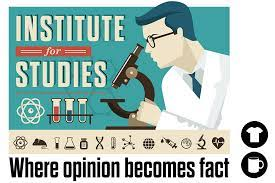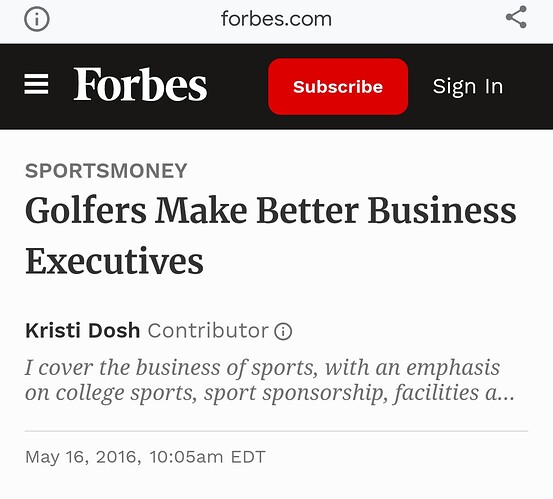I have no idea man but I suppose the folks at Harvard University and statisticians will know better than me about golfing too much…
I’m not having a go at you @Notasuperfan, but I’ve never put much store in studies like this. For every study like this there’ll be one that says that “not enough golf makes for a bad CEO”. To even undertake a study of the effects of golf on CEOs and their companies makes me think that the proposer of the study maybe has an agenda. Surely it’s easy enough for an owner to worker out on their own if they think that their company is going to the dogs and their CEO is spending too much time golfing?
I heard a story on the radio news one day whilst driving. “Scientists have discovered that cats have five distinct personalities”. I mean, WTF? I thought to myself that they should have led with the news that Cancer and all other illnesses had been cured? I assumed that they must have because these ‘scientist’ could waste time and money on studying cat personalities? ![]()
![]()

Again you can find plenty of stuff on the internet to support your narrative if you try hard enough.
Shouldn’t the author’s name be Kushti Dosh? ![]()
Too on the nose that ![]()
So can someone explain to a thicko like me how this works.
FSG looking for someone to invest. Say for example thats me.
I give them what they want - whats in it for me because not many people make money out of football clubs?
Say I give them £500m - what do I get out of it other than Jurgen spending it all (which is fine) but what do I get back in return? Winning League and CL doesn’t pay that much.
If we sell you, say 10% of the club for X amount.
The money is used to invest in the club. If the club increases in value from what it is worth now over the next 5 to 10 years, you could then sell that 10% for more money than you paid for it.
Of course, there’s no guarantee about how much your investment will be worth. And there’s no guarantee that there will be a buyer for your 10%.
But what would an expert in animal behaviour be much use to Cancer Research.
You don’t go to a Knee Doctor for brain surgery.
![]()
I shit you not, one of my MOL’s brain tumour consultants was called Mr Patella.
That is sort of the appeal of FSG as an investment vehicle. They manage to make money in their sports investments in competitions where traditionally performance is rather erratic. FSG manages that in two ways
i) Growing revenues at the property in question, in particular diversifying revenue streams, while following a very disciplined investment model. This depends very much on their perception of the underlying potential of the team, versus where it is at the point of purchase. Boston was playing in a run-down dump of a stadium, but reliably selling out Fenway in one of the wealthiest markets in baseball. The analogy to Liverpool a decade later was pretty obvious. In both cases, they put capital in early on to build revenue streams (stadium, broader match day revenue from food & drink, etc). The idea here is the club appreciates in value, and at some point FSG unitholders can sell their units, even if FSG retains the sports property.
ii) One of the major revenue areas of focus is commercial income, sponsorship revenue and similar. FSG are very careful when they state that they have never taken money out of Boston or Liverpool, except for repayment of zero-rated debt used to pay for infrastructure. What that somewhat obscures is the role of FSM (m for marketing), the FSG entity that handles the sponsorship files - FSM takes a percentage of all of the deals for LFC, the Red Sox, Haas, etc., before it reaches the respective teams. FSG investors have been getting dividends from FSG for years, from those revenue streams.
At Queen’s University Medicine (Kingston, not the one in Belfast), the professor who taught Autopsy Pathology for years was Dr.Deth.
Football is part of a huge sprawling commercial environment in which the football club is only a small part. A strategic partnership would be one where owning a stake in a football club makes those ancillary services more profitable. So what they are likely looking for is someone who has a stake in a different part of the industry where combining them under one umbrella would help make the total value of all the companies higher than the sum of their parts if they existed independently. It’s a form of what is called Vertical Integration.
So the issue is not just do you have your 500million, but what else do you bring to the table that can make the value of the entire portfolio of businesses higher
EDIT: as I was writing this I see @Arminius answered something similar citing the FSM. The fact FSG already have parts of this taken care within their umbrella makes the market of potential strategic partners smaller. The flip side is they have likely identified the areas where there are opportunities, which might make the search a bit more targeted even if narrower.
I’m having difficulty visualizing what kinds of things these might be. Would you (or @Arminius) be able to provide some more examples?
This situation with FSG’s marketing arm for instance, how might that type of service be structured at a different football club? Is the facilitation of commercial deals something that would typically be outsourced?
One of the things I am watching for is whether the minority investor will have the means, and acumen, to take over the whole club down the line. That may be a consideration for FSG, at least to have as an option.
I have to think the reason the investment is possibly in LFC (or an intermediary vehicle) rather than FSG is for precisely that reason.
Probably not without talking out of my arse. But…

Looking at Barcelona does provide some examples though. They responded to their financial crunch by selling big stakes in two in house assets, a licensing a merchandise company and Barcelona studios. No club NEEDS these divisions, but you can understand how bringing them in house rather than getting these services from a third party might create some cost efficiencies. Are there opportunities to broaden the merchandise operation if you’ve got your own team doing it? At there external opportunities that present themselves as a result of association with LFC that wouldnt exist if some third party company was just delivering merch on a contract? Look at LFCTv…is it properly monetized? Does it have the content to be? What external opportunities do you have if you expand the scope of it? Is there something different you can do with broadcast rights if you expand what this service offers?
An example at my company is we found there was one part of the lifecycle of our projects that typically we’d not be contracted for that always struggled. External vendors typically were not good (it was a time of rapid industry change and not enough people had adapted their methods well enough) and so we ended doing a lot of it ourselves in a rescue effort, and we did it to really good effect. The challenge was were eating into the resources of a department that were supposed to be doing other things. So we ended up spinning up a whole new company out of their services. We now add that part of the project lifecycle to every project we work on, and even though the extra revenue we get for it is all a pass through for us, it still goes into our books, which due to accountancy fuckery is supposedly a big benefit (a 10 million contract in which we pay 9.5 million in pass through costs, is worth more to us than a 500k contract with no pass throughs). They cannot be viable from our business alone, but they started up safe in the knowledge of getting 100% of our business and that drastically cuts the marketing budget for them relative to if they were a standalone company.
Not unreasonable after 8 years a 2% raise.
Should be inline with inflation.
